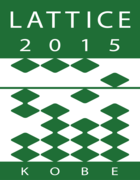Speaker
Akihiro Shibata
(Computing Research Center, KEK)
Description
We have pointed out that the SU(3) Yang-Mills theory has a new way of reformulation
using new field variables (minimal option), in addition to the conventional option
adopted by Cho, Faddeev and Niemi (maximal option).
The reformulation enables us to change the original non-Abelian gauge field into
the new field variables such that one of them called the restricted field gives
the dominant contribution to quark confinement in the gauge-independent way.
In the minimal option, especially, the restricted field is non-Abelian U(2) and involves
the non-Abelian magnetic monopole. In the preceding lattice conferences, we have accumulated
the numerical evidences for the non-Abelian magnetic-monopole dominance in addition to
the restricted non-Abelian field dominance for quark confinement supporting the non-Abelian
dual superconductivity using the minimal option for the SU(3) Yang-Mills theory.
This should be compared with the maximal option which is a gauge invarient version
of the Abelian projection in the maximal Abelian gauge: the restricted field is Abelian
U(1) x U(1) and involves only the Abelian magnetic monopole, just like the Abelian projection.
In this talk, we focus on discriminating between two reformulations, i.e., maximal and minimal options
of SU(3) Yang-Mills theory for quark confinement from the viewpoint of dual superconductivity. For this purpose, we measure the distribution of the chromoelectric flux connecting a quark and an antiquark and the induced magnetic-monopole current around the flux tube.
Primary author
Akihiro Shibata
(Computing Research Center, KEK)
Co-author
Prof.
Kei-Ichi Kondo
(Chiba University)

